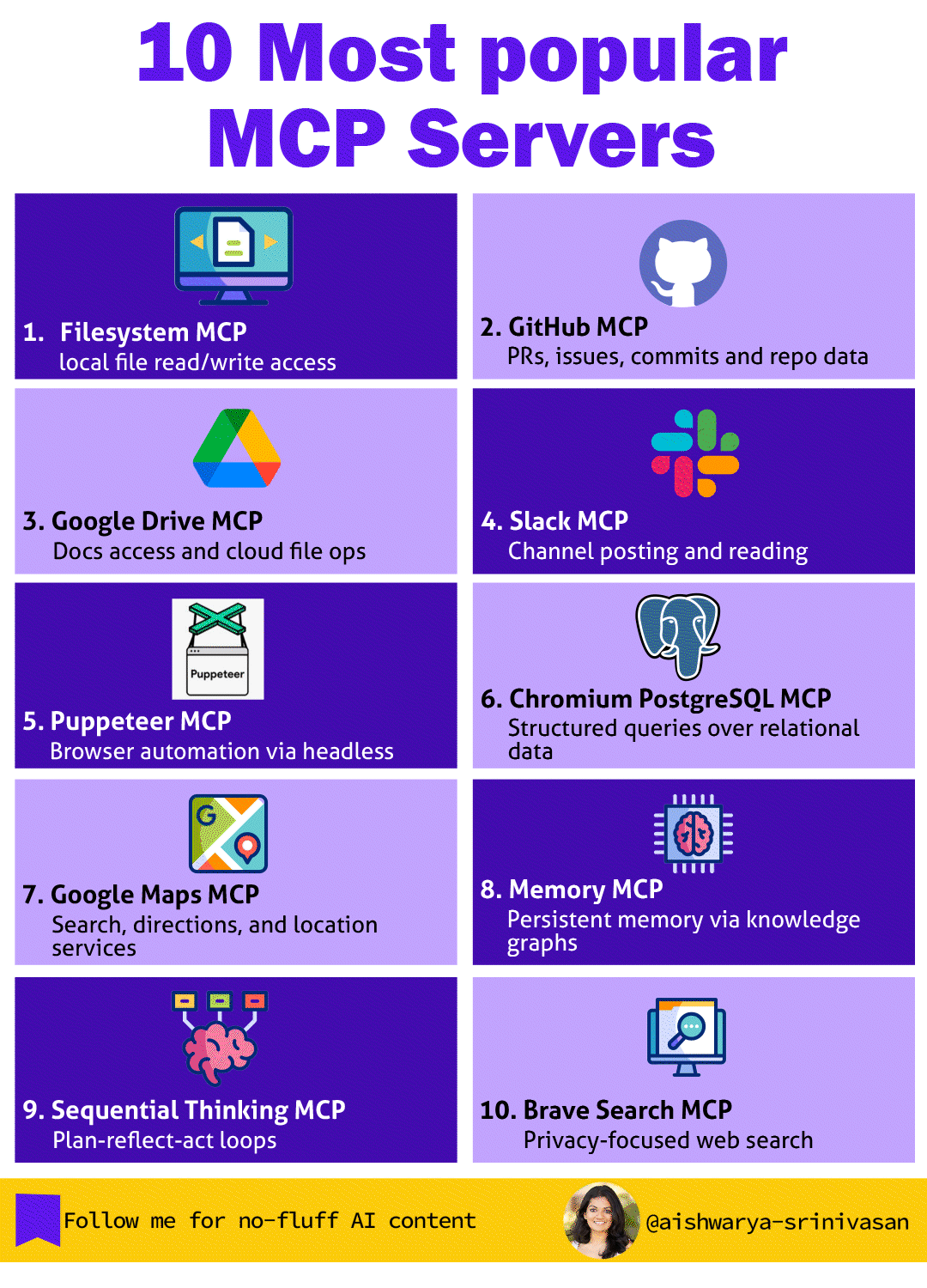Most Popular MCP Servers and what you can build with them
If you’re serious about building Agentic AI systems, stop starting from the model.
Start from the use case.
The real engineering challenge today isn’t which model to use, it’s how to design composable systems that reason, act, and evolve.
You can have the best foundation model out there: Qwen 3, DeepSeek R1, Claude 3.5, take your pick, but without orchestration, memory, and tool access, you’re still stuck in a sandbox.
That’s where MCP (Model Context Protocol) comes in.
Why MCP Matters in Agentic Architectures
At its core, MCP defines a standard protocol for how LLMs communicate with external systems.
Think of it as the missing middleware layer that connects reasoning models with the environment they operate in.
Instead of custom API wrappers, MCP servers provide structured access to resources- files, databases, APIs, or browser sessions, in a consistent and auditable way.
That means you can build once and reuse across frameworks like LangGraph, CrewAI, AutoGen, or even your custom orchestration stack.
MCP solves three key engineering pain points:
Integration overhead: no more ad hoc wrappers for every new tool.
State management: tools can expose capabilities with context persistence.
Traceability: each action is logged via schema-defined requests and responses.
This makes MCP a foundation for safe, scalable, and interoperable agent design.
How MCP Fits into the Agentic Stack
If you visualize your stack, it looks like this:
[LLM Policy] → [Agent Framework] → [MCP Server Layer] → [External Systems]The LLM policy (e.g., Mistral 7B, Claude 3.5, or Fireworks endpoints) handles reasoning.
The Agent Framework (LangGraph, CrewAI) manages planning, error recovery, and coordination.
The MCP Server Layer executes real-world actions: reading files, fetching data, controlling browsers, or updating Slack threads.
That separation of concerns- reasoning vs. acting, is what allows modern agentic architectures to scale safely.
⚙️ MCP Servers You Can Experiment With Right Now
Here are ten production-ready MCP servers you can start experimenting with today, each one paired with a concrete portfolio project idea you can build.
→ Filesystem MCP – Local file read/write access
Project idea:
Build a Report Generator Agent that takes structured output (like SQL query results or logs), summarizes them via your LLM, and writes neatly formatted Markdown or PDF reports to your local directory. Perfect for showcasing tool execution and file-level persistence.
→ GitHub MCP – Access PRs, issues, commits, and repo metadata
Project idea:
Create a Code Review Copilot that analyzes open PRs, runs a reasoning loop on diffs, and posts contextual review comments directly to GitHub. Demonstrates tool use, reasoning, and developer workflow automation.
→ Google Drive MCP – Interact with Docs, Sheets, and cloud file storage
Project idea:
Build a Team Knowledge Curator that summarizes documents from shared drives and creates an AI-generated digest, syncing summaries back to a Google Doc automatically. Great project for showing enterprise workflow integration.
→ Slack MCP – Post to channels, read messages, automate workflows
Project idea:
Design a Meeting Recap Agent that listens to summarized transcripts or updates from your agents, formats them cleanly, and posts concise takeaways to a Slack channel. Demonstrates communication and team assistive capabilities.
→ Puppeteer MCP – Browser automation via headless Chromium
Project idea:
Build an Automated Research Assistant that performs live searches, visits relevant pages, extracts structured data, and generates brief summaries. This one highlights autonomous information retrieval and reasoning under real-world constraints.
→ PostgreSQL MCP – Structured queries over relational data
Project idea:
Develop an Agentic Data Analyst that queries structured tables, performs aggregations, and generates insights in natural language. The system can even store visualizations locally via Filesystem MCP. Excellent for showcasing database integration.
Keep reading with a 7-day free trial
Subscribe to AI with Aish to keep reading this post and get 7 days of free access to the full post archives.


